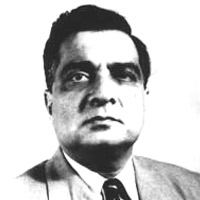Iskander Mirza was born on November 15, 1899, in a feudal family of Bengal. Educated at Elphinstone College, the British sent him to the Sandhurst Academy in England for army training in 1918. Upon his return he was inducted into the British Indian Army in 1919. In 1926, he left the army, joined the Indian Political Service and was posted as Assistant Commissioner in North West Frontier Province. He was promoted to District Officer in 1931. Much of his career as a District Officer was spent in the Tribal Areas. Before the creation of Pakistan, he served the Ministry of Defense, Government of India, as a Joint Secretary. At the time of Partition, he was appointed as a member of the team that was to divide the personnel and assets between the Indian and Pakistan Army.
Being the senior-most Muslim Civil Servant in the Indian Ministry of Defense, Iskander Mirza was appointed as the first Defense Secretary of Pakistan at the time of Independence. He served at this position for about seven years. With the dismissal of the United Front’s Ministry in East Pakistan, Governor General Ghulam Muhammad decided to enforce Governor’s Rule in the province and appointed Iskander Mirza as Governor in May 1954.
Assuming charge of the province, he openly declared that he would not hesitate to use force in order to establish peace in the province. The first step he took as Governor was to order the arrest of 319 persons, including the two most outspoken leaders, Mujib-ur-Rahman and Yousaf Ali Chaudhry. By mid June, the number of persons arrested had reached 1,051, including 33 Assembly Members and two Dhaka University Professors. By doing so he was able to bring immediate peace, but in the process had sown a permanent seed of hatred for the Central Government in the hearts of the people of East Pakistan.
From October 1954 to August 1955, Iskander Mirza served as the Interior Minister, and then as the Minister of States and Frontier Regions in the Cabinet of Prime Minister Muhammad Ali Bogra. Ghulam Muhammad, due to his illness, went on a two months leave and left the ground for Iskander Mirza to assume the post of acting Governor General on August 7, 1955. However, this temporary charge was soon made permanent. He appointed Chaudhry Muhammad Ali, another bureaucrat, as the Prime Minister of the country. When the Constitution of 1956 was adopted, the title of the head of state of Pakistan was changed from Governor General to President, but the duties and powers associated with the office did not change to a great extent. The Constituent Assembly unanimously elected Iskander Mirza as the first President of Pakistan.
Primarily, Iskander Mirza was a Civil Servant and it is widely believed that he lacked the parliamentary spirit. He was of the view that because of the lack of training in the field of democracy and the low literacy rate amongst the masses, democratic institutions cannot flourish in Pakistan. He never had a very high opinion about Pakistani politicians and once referred to them as “mostly crooks and scalawags”. He wanted controlled democracy for Pakistan with more powers for the civil bureaucracy. He believed that the Magistrates should be given the same powers, which they used to enjoy during the British Raj. He thought that politicians should be given the power to make policy but they should not interfere in the administration. Iskander Mirza was also a great advocate of the One Unit scheme. In his opinion religion was to be kept at a distance from politics.
History documents that like his predecessor Ghulam Muhammad, Iskander Mirza was a power hungry person and wanted to dominate the political scene of the country by any way possible. Being the head of state, he always remained active in power politics and played the role of a kingmaker. He took full advantage of the weakness of politicians and played them against each other. To offset the influence of the Muslim League, he played an active role in the creation of the Republican Party. During his short span of four years as the head of state, four Prime Ministers were changed. Most historians believe that Iskander Mirza was responsible for this political instability.
Iskander Mirza felt threatened by the reorganization of the Muslim League and the alliance of the Awami League with the Punjabi groups in mid 1958. On October 7, he issued a proclamation abrogating the 1956 Constitution. According to the proclamation, the Central and the Provincial Assemblies were dissolved and the first Martial Law was enforced in the country. Iskander Mirza himself remained President and appointed Ayub Khan as the Martial Law Administrator and the Supreme Commander of the armed forces. Ayub Khan proved to be smarter than the politicians and refused to act as puppet in the hands of the President. On October 27, 1958, Ayub Khan compelled Iskander Mirza to leave the country, assumed himself the title of President, and announced that Martial Law would continue in order to give legal cover to certain reforms he wanted to put through.
Iskander Mirza spent rest of his life in a hotel room in London. He died on November 15 1969.
This article was last updated on Sunday, June 01, 2003






